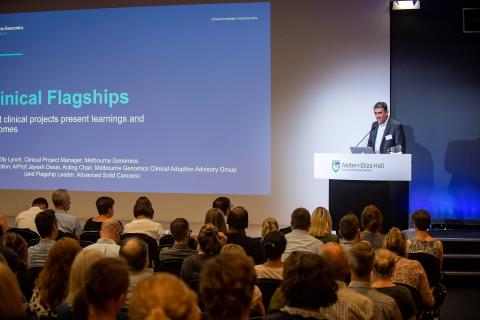
More than 20 speakers shared results and lessons learned from the Melbourne Genomics program of 90 projects at our recent half-day symposium.
The 250 symposium attendees were officially welcomed by Victorian Parliamentary Secretary for Health, Mr Anthony Carbines, who described the Alliance’s work as “indispensable”.
Mr Carbines announced the formal commencement of the Alliance members’ shared clinical system for genomics, GenoVic, with the first patient data run through the system by member site – Victorian Clinical Genetics Services (VCGS). Melbourne Genomics is funded by the Victorian Government and the 10 Alliance members.
The official welcome was followed by reporting of results from eight of Melbourne Genomics’ eleven clinical research projects, showcasing positive patient outcomes.
“The Alliance has provided a platform for clinicians, researchers and scientists to collaborate and share resources on an unprecedented level,” said Dr Cathy Quinlan, Leader of Melbourne Genomics’ Renal Genetics Flagship, reflecting on the findings presented.
“These clinical projects, across diverse areas of medicine, are providing strong evidence for when patients can benefit from genomic testing, while also readying the healthcare system for wider-scale implementation of genomics.”
Dr Sebastian Lunke (VCGS) was joined by Dr Wishva Herath (Monash Health), Associate Professor Zornitza Stark (VCGS) and Associate Professor Paul James (Melbourne Health) for the session focusing on the Alliance’s clinical system for genomics, GenoVic.
The afternoon symposium concluded with a panel exploring the intersection between research and clinical care, chaired by Melbourne Genomics Executive Director Associate Professor Clara Gaff. Panellists Dr Jason Trubiano, Dr Vanessa Bryant, Dr Kortnye Smith and Lyndon Gallacher each described the ways their research work in genomics is improving patient outcomes – through deeper research on immunology genes, through greater identification of severe antibiotic allergy, through providing answers for children with very rare genetic conditions, and through better matching treatments to cancers.
“As Melbourne Genomics continues to evaluate the impact of genomics across inherited disease, cancer and antimicrobial control, it is exciting to see how collaboration between clinicians, genetic counsellors, health service researchers and scientists is already changing care for patients,” said Associate Professor Gaff.
The event concluded with news of a two-day Symposium, 7-8 November, which will present comprehensive findings from the current Melbourne Genomics program.
